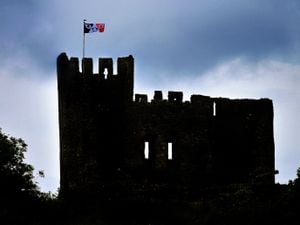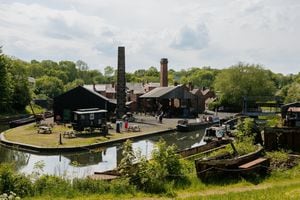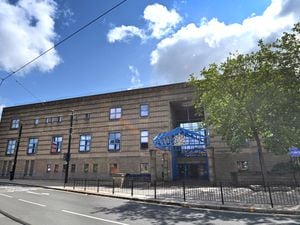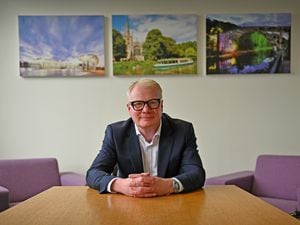COMMENT: I’m Yam Yam and proud - but don’t call me Brummie
Eileen Wells is Dudley born and bred and could not be prouder of a home steeped in history.

We are Yam Yams and proud of it – so please don’t call us Brummies.
And there’s certainly plenty to be proud of, not least our oft-derided accent which gave us our distinctive nickname.
In fact, despite a tendency of the ill-informed to link our way of speaking with a lack of education, it’s us Black Country folk who have retained perhaps the purest form of the English language.
If there’s any doubt, listen to the works of the great poet and author Geoffrey Chaucer, often called the father of English literature, and you’ll hear echoes our lovely, colourful and descriptive dialect.
One theory of why the Black Country retains one of the last examples of early English spoken today is that, because of a lack of navigable rivers and its distance from the sea, the region was the last to be infiltrated by invaders, foreign visitors and other influencers of our language. So, the so-called “Queen’s English” favoured by the aristocracy and considered a standard of good education, is not the proper way to “spake” after all.
The term Yam Yam, of course, comes from our way of condensing the words “yow am” (“you are” to the uninitiated), to yow’m or yam. It’s part of a dialect which is all the more joyous because it’s often incomprehensible to non-locals, making it even more fun to be part of our special clan.
Legendary local delicacies like faggots, scratchings or grey paes 'n' bacon are also special. And then there’s the beer. No fizzy lager for a true Black Country “mon”. It has to be real ale – Batham’s, Holden’s or other local brews. All enjoyed in one of the many characterful hostelries.
It’s no secret that some of the best pints are pulled in the Black Country, and an incredible 69 pubs were mentioned in Camra’s Good Beer Guide last year.

But our brilliant history is not just built on beer and banter. It’s true to say that Black Country folk changed the world through hard graft and ingenuity. One of our tourist treasures, The Black Country Living Museum, documents how our region built the world’s first successful steam engine; put the first steam train, the Stourbridge Lion, on US soil; fuelled the introduction of the first minimum wage; produced the anchor for the Titanic; practically built London’s Crystal Palace and so much more.
The intensity of the region’s industry meant the sky was lit by the glow of furnaces by night and the air hung heavy with smog by day. In 1862, it was this smoky, mine-scared landscape which prompted the American Consul to Birmingham Elihu Burritt to famously describe the region as “black by day and red by night”. Walsall’s leather industry had over a hundred firms exporting their products throughout the British Empire and beyond by the end of the nineteenth century. They also emerged as major supplier of military saddlery and harnesses.
From the early 20th century, the Black Country earned a reputation worldwide for the quality of goods it shipped around the globe. Coal mines, iron foundries, glass factories, brick works and more dominating the landscape.
French glassmakers were reputedly attracted to the area by the rich natural resources of coal and fireclay for lining furnaces. Stourbridge glass became renowned as among the finest in the world and has been used numerous times as gifts for royalty and visiting dignitaries. Its glassware was also chosen to grace the captain’s table on the ill-fated Titanic – whose anchor was made in Netherton.
And it’s hard to imagine today’s landscape was once covered by shallow tropical seas full of coral reefs, and that 430 million years ago it was home to Dudley’s oldest resident, the Dudley Bug. In the past, quarrymen found this little trilobite so frequently that it was incorporated in to Dudley’s coat of arms. The marine fossil made Dudley’s Wren’s Nest National Nature Reserve a site of exceptional importance. It is one of the most notable geological locations in the British Isles and visited and studied by experts globally.
Plenty to be proud of then – all thanks to the gritty and witty, down-to-earth people who toiled in the forges, foundries, factories and stoked the furnaces of the region. So it comes as no surprise that the Black Country has also produced more than its fair share of personalities to make their mark in sport and the arts.
Pop star Liam Payne, actress Meera Syal, singer Beverley Knight, all from Wolverhampton; comedian Frank Skinner, Led Zeppelin frontman Robert Plant, Olympic gold-medalist Denise Lewis, all from West Bromwich; Dudley comedian, fundraiser and Shakespearian actor Lenny Henry, Walsall’s Noddy Holder of Slade, Smethwick-born actor Dame Julie Walters are just a few of our local heroes.
Add in our top football teams and there’s still plenty to cheer about, despite the area’s topsy-turvy industrial and economic fortunes.
We have our castle, caverns, canals, markets, monuments and manors. We have our self-depreciating humour, community spirit and strength of character.
And while there’s much debate about where the boundaries of the Black Country lie, there’s one thing we are sure about – we’re proud to be Yam Yams, aye we?





